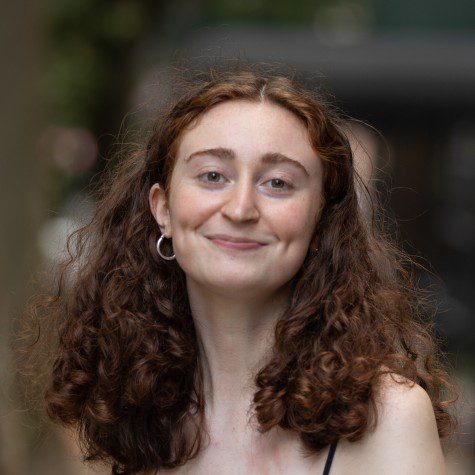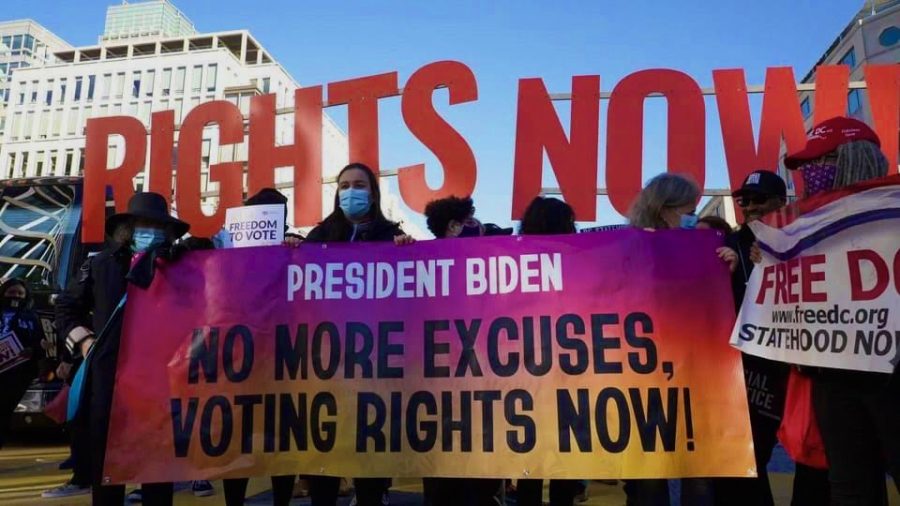5 NYU students, 2 profs arrested outside White House
In an act of civil disobedience, a group refused to move from the sidewalk of a street near the White House, calling on the Biden administration to pass legislation protecting voting rights.
Five NYU students and two professors were arrested for civil disobedience in Washington, D.C., on Nov. 3. They refused to move from a sidewalk near the White House in an effort to call on President Joe Biden to eliminate the Senate filibuster and enact federal voting rights legislation.
The group from NYU — students Noa Baron, Josh Horowitz, Jasmin Prophete, Merly Lopez and Autumn Muñoz and professors Sally Guttmacher and Noelle Damico — attended as members of The Workers Circle, a Jewish nonprofit advocating for social and economic justice. They joined seven other activist organizations in demonstrating for the passage of the Freedom to Vote Act and the John Lewis Voting Rights Advancement Act.
Around 250 demonstrators gathered in Lafayette Square, located across the street from the White House. Approximately 60 of them — including the NYU group — stepped onto the adjacent Pennsylvania Avenue as part of a planned action. One of the 60 demonstrators was Yolanda Renee King, the 13-year-old granddaughter of Martin Luther King Jr.
“Right now, our democracy is really at a crossroads,” Damico, a Wagner professor and The Workers Circle's social justice director, said. “What happens next is going to be up to us. As more and more people step forward and are willing to risk arrest to drive home how serious it is that we get these bills passed, the more we’ll see President Biden using the full power of his office.”
Since the 2020 presidential election, at least 19 states have passed 33 laws to restrict voting access, according to the Brennan Center for Justice at NYU Law. The legislation has been fueled by Republicans galvanized by former President Donald Trump’s false claims of widespread voter fraud.
“While the 2020 election had the largest turnout in a century, in particular, Black and brown Americans surmounted barriers to cast their votes in record numbers,” Damico said. “Almost immediately afterwards, there was backlash that came in a number of forms. Among them, the hundreds of bills that would institute barriers at the state level to voting, and some of those opened the door to the possibility of overturning election results.”
BREAKING: Young people under the age of 18 were just taken away by the police for demonstrating in front of the White House for #votingrightsnow. Our movement for the freedom to vote is #poweredbyyouth - and we’re not backing down. pic.twitter.com/Cvv7h5aMsO
— People For the American Way (@peoplefor) November 3, 2021
Damico was previously arrested at two similar actions in Washington on Oct. 5 and Oct. 19 after advocating for the Freedom to Vote and John Lewis acts, which would designate election days as federal holidays and create national standards for early voting and mail-in ballots. Republicans blocked Senate Democrats’ push to pass the Freedom to Vote Act on Oct. 20, but Biden has said he is now open to ending the filibuster — a 60-vote supermajority rule — in order to enact the legislation.
Baron, a CAS senior and the organizing and voting rights intern at The Workers Circle, recruited other students to join the demonstration. They attended the protest to call for an end to gerrymandering and for the overturning of bans on providing food and water to voters in election lines.
“Voting rights is a means, rather than an end,” Baron said. “I want climate change to be fixed, and I want healthcare for everyone. But none of that is going to happen if we don’t have voting rights. If the election isn’t fair, then we can’t possibly have a fair and true democracy.”
University spokesperson John Beckman affirmed NYU’s support of its students and employees’ freedom of speech, but did not comment on the group that was arrested.
“NYU fully respects the rights of its community members to engage in peaceful protest and to express their views, and the University believes in the importance of the greatest possible voter participation in elections,” Beckman wrote in a statement to WSN.
NYU’s Washington Square and Brooklyn campuses primarily fall under New York’s 8th, 10th and 12th Congressional Districts. College campuses across the United States — especially those of historically Black colleges and universities — are often targets of gerrymandering, diminishing the power of student votes.
Guttmacher, professor emeritus of Global Public Health and former chair of the Faculty Network for Student Voting Rights, said gerrymandering leaves many students confused when voting.
“Students face all sorts of barriers, and I feel it’s important as an academic and professor of students to try to see if it can change so that it’s easier for students to vote,” she said. “The Faculty Network for Student Voting Rights has also been organized around this to make it easier to get faculty to engage students and help them figure out how to register to vote.”
Prophete, an LS sophomore, noted the importance of correcting gerrymandered districts, so that every individual is electorally aligned with their community.
“A lot of people fixate on the impact it has on party representation and which politicians it’ll hurt, but these imaginary lines that we use to divvy up communities have a very real and terrible impact on their day to day lives as well,” they said. “Districts need to be drawn in such a way that prioritizes the needs and voices of the people who live within them, not politicians.”
Tisch junior Horowitz said the bills would also permit early voting, voting by mail and absentee voting in every state — practices that gained traction during the 2020 election due to COVID-19. He added that the legislation restores the voting rights of incarcerated and formerly incarcerated people and expedites the voting registration process.
“One of the points of civil disobedience is to publicize the unjust legal consequences of the current system,” Horowitz said. “I would love for my fellow students to be aware that they are full participants in the political project of this country and their voices ought to be heard, not only in legal, official forums but in active protest of the flaws of those legal forums.”
Prophete said that the protest was meant to stir up “good trouble” and disrupt the White House in hopes of preventing future attacks on the right to vote.
“If you’re not committed to disturbing the status quo, then you’re demonstrating to those in power that there are no tangible consequences to perpetuating injustice,” Prophete said. “We don’t lose as a people until we stop believing in our power and until we allow ourselves to be fully convinced that resistance of any kind is a waste of time. It’s important to remember that even small victories represent progress, but if we win here, it’ll be a huge one.”
On Wednesday, Nov. 3, Senate Republicans blocked debate of the John Lewis act, meant to update the Voting Rights Act. Democratic efforts to pass the legislation remain stalled ahead of the 2022 midterm elections.
Contact Rachel Cohen at [email protected].

Rachel Cohen is a junior double-majoring in journalism and politics. She is interested in reporting on local news, city and national politics, and social...


























































































































































